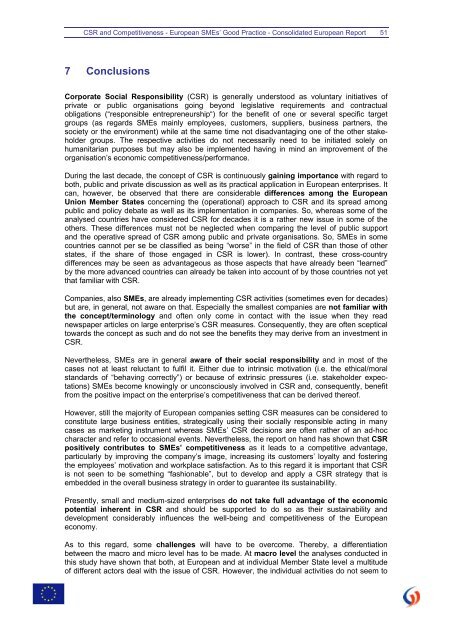CSR and Competitiveness European SMEs - KMU Forschung Austria
CSR and Competitiveness European SMEs - KMU Forschung Austria
CSR and Competitiveness European SMEs - KMU Forschung Austria
Create successful ePaper yourself
Turn your PDF publications into a flip-book with our unique Google optimized e-Paper software.
<strong>CSR</strong> <strong>and</strong> <strong>Competitiveness</strong> - <strong>European</strong> <strong>SMEs</strong>’ Good Practice - Consolidated <strong>European</strong> Report 51<br />
7 Conclusions<br />
Corporate Social Responsibility (<strong>CSR</strong>) is generally understood as voluntary initiatives of<br />
private or public organisations going beyond legislative requirements <strong>and</strong> contractual<br />
obligations (“responsible entrepreneurship“) for the benefit of one or several specific target<br />
groups (as regards <strong>SMEs</strong> mainly employees, customers, suppliers, business partners, the<br />
society or the environment) while at the same time not disadvantaging one of the other stakeholder<br />
groups. The respective activities do not necessarily need to be initiated solely on<br />
humanitarian purposes but may also be implemented having in mind an improvement of the<br />
organisation’s economic competitiveness/performance.<br />
During the last decade, the concept of <strong>CSR</strong> is continuously gaining importance with regard to<br />
both, public <strong>and</strong> private discussion as well as its practical application in <strong>European</strong> enterprises. It<br />
can, however, be observed that there are considerable differences among the <strong>European</strong><br />
Union Member States concerning the (operational) approach to <strong>CSR</strong> <strong>and</strong> its spread among<br />
public <strong>and</strong> policy debate as well as its implementation in companies. So, whereas some of the<br />
analysed countries have considered <strong>CSR</strong> for decades it is a rather new issue in some of the<br />
others. These differences must not be neglected when comparing the level of public support<br />
<strong>and</strong> the operative spread of <strong>CSR</strong> among public <strong>and</strong> private organisations. So, <strong>SMEs</strong> in some<br />
countries cannot per se be classified as being “worse” in the field of <strong>CSR</strong> than those of other<br />
states, if the share of those engaged in <strong>CSR</strong> is lower). In contrast, these cross-country<br />
differences may be seen as advantageous as those aspects that have already been “learned”<br />
by the more advanced countries can already be taken into account of by those countries not yet<br />
that familiar with <strong>CSR</strong>.<br />
Companies, also <strong>SMEs</strong>, are already implementing <strong>CSR</strong> activities (sometimes even for decades)<br />
but are, in general, not aware on that. Especially the smallest companies are not familiar with<br />
the concept/terminology <strong>and</strong> often only come in contact with the issue when they read<br />
newspaper articles on large enterprise’s <strong>CSR</strong> measures. Consequently, they are often sceptical<br />
towards the concept as such <strong>and</strong> do not see the benefits they may derive from an investment in<br />
<strong>CSR</strong>.<br />
Nevertheless, <strong>SMEs</strong> are in general aware of their social responsibility <strong>and</strong> in most of the<br />
cases not at least reluctant to fulfil it. Either due to intrinsic motivation (i.e. the ethical/moral<br />
st<strong>and</strong>ards of “behaving correctly”) or because of extrinsic pressures (i.e. stakeholder expectations)<br />
<strong>SMEs</strong> become knowingly or unconsciously involved in <strong>CSR</strong> <strong>and</strong>, consequently, benefit<br />
from the positive impact on the enterprise’s competitiveness that can be derived thereof.<br />
However, still the majority of <strong>European</strong> companies setting <strong>CSR</strong> measures can be considered to<br />
constitute large business entities, strategically using their socially responsible acting in many<br />
cases as marketing instrument whereas <strong>SMEs</strong>’ <strong>CSR</strong> decisions are often rather of an ad-hoc<br />
character <strong>and</strong> refer to occasional events. Nevertheless, the report on h<strong>and</strong> has shown that <strong>CSR</strong><br />
positively contributes to <strong>SMEs</strong>’ competitiveness as it leads to a competitive advantage,<br />
particularly by improving the company’s image, increasing its customers’ loyalty <strong>and</strong> fostering<br />
the employees’ motivation <strong>and</strong> workplace satisfaction. As to this regard it is important that <strong>CSR</strong><br />
is not seen to be something “fashionable”, but to develop <strong>and</strong> apply a <strong>CSR</strong> strategy that is<br />
embedded in the overall business strategy in order to guarantee its sustainability.<br />
Presently, small <strong>and</strong> medium-sized enterprises do not take full advantage of the economic<br />
potential inherent in <strong>CSR</strong> <strong>and</strong> should be supported to do so as their sustainability <strong>and</strong><br />
development considerably influences the well-being <strong>and</strong> competitiveness of the <strong>European</strong><br />
economy.<br />
As to this regard, some challenges will have to be overcome. Thereby, a differentiation<br />
between the macro <strong>and</strong> micro level has to be made. At macro level the analyses conducted in<br />
this study have shown that both, at <strong>European</strong> <strong>and</strong> at individual Member State level a multitude<br />
of different actors deal with the issue of <strong>CSR</strong>. However, the individual activities do not seem to




